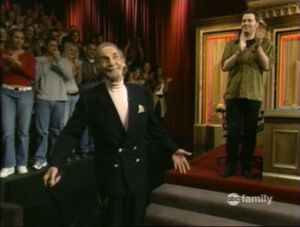|
"If someone had come up and said, “Okay, your career has to stop right now,” I would’ve gone, “Great, fine,” because it was such a thrill to work with him. Again, someone I was a big fan of when I was growing up. The fact that he and his group of actors and writers did a 90-minute live show every week is just amazing, so the fact I got a chance to actually improvise with him was amazing. It truly was one of the highlights of my life and my career." |

Isaac Sidney "Sid" Caesar (8 September 1922 – 12 February 2014) was an American comic actor and writer. He is best known for the pioneering 1950s live television series Your Show of Shows, a 90-minute weekly show watched by 60 million people, and its successor Caesar's Hour, both of which influenced later generations of comedians. He also acted in movies; he played Coach Calhoun in Grease (1978) and its sequel Grease 2 (1982) and appeared in the films It's a Mad, Mad, Mad, Mad World (1963), Silent Movie (1976), History of the World, Part I (1981), and Cannonball Run II (1984).
Caesar was considered a "sketch comic" and actor, as opposed to a stand-up comedian. He also relied more on body language, accents, and facial contortions than simply dialogue. Unlike the slapstick comedy, which was standard on TV, his style was considered "avant garde" in the 1950s. He conjured up ideas and scenes, and used writers to flesh out the concept and create the dialogue. Among the writers who wrote for Caesar early in their careers were Mel Brooks, Neil Simon, Larry Gelbart, Carl Reiner, Michael Stewart, Mel Tolkin and Woody Allen. "Sid's was the show to which all comedy writers aspired. It was the place to be," said Steve Allen.
His TV shows' subjects included satires of real life events and people, and parodies of popular film genres, theater, television shows, and opera. Unlike other comedy shows at the time, the dialogue was considered sharper, funnier, and more adult-oriented. He was "...best known as one of the most intelligent and provocative innovators of television comedy," whom some critics called television's Charlie Chaplin and The New York Times refers to as the "...comedian of comedians from TV's early days."
Honored in numerous ways over sixty years, he was nominated for eleven Emmy Awards, winning twice. He was also a saxophonist and author of several books, including two autobiographies in which he described his career and later struggle to overcome years of alcoholism and addiction to barbiturates.
Appearances[]
On 21 November 2001, Caesar appeared in Episode 4-15, "The Salute to American Television Special".

